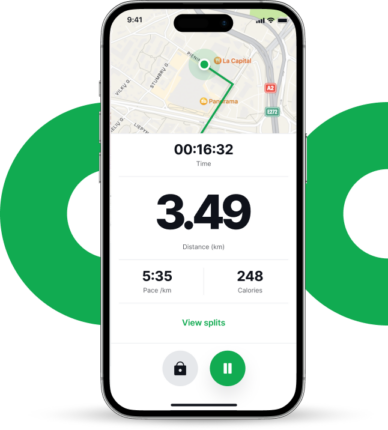Regularly running 3km every day has many benefits for your body, including increasing lower-body muscle strength and endurance, improving cardiovascular health, boosting mental well-being, and aiding in weight loss. However, it’s important to strike a balance and avoid overdoing it without adequate rest, as this can lead to potential drawbacks over time.
While 3km may not seem like a lot (around 1.86 miles), it can add up to over 55 miles in a month. As a beginner, it’s important to consider the implications of such consistent distance and its potential impact on your body.
In this article, we will explore the effects of running 3 kilometers a day on your body, examining both the pros and cons. This will help you make an informed decision about whether this distance is appropriate for your fitness goals and overall well-being. Read on to learn more.
In This Article
In This Article:
Running 3km Every Day
Going from sedentary to running 3km daily at a moderate pace can be transformative. In fact, running as little as 2 miles a day can already bring benefits to your body. It can help you lose weight, become fit, and fall in love with running.
“So what will happen if I run 3km every day?” you ask. Here’s an overview of the potential benefits and drawbacks of following this new running routine.
- Improved cardiovascular health
- Increased stamina
- Increased calorie burn and body fat loss
- Strengthened bones
- Stronger core and back stability
- Reduced stress
- Better overall health
- Higher risk of overuse injuries and associated pain (long-term)
- Increased joint stress (long-term)
- Fatigue and burnout
Should You Run 3km Every Day?
Whether or not you should run 3km every day depends on your fitness level and goals. Take into account your age, experience, any existing health conditions, stamina, weight, and fitness routine.
If you’re a healthy adult with some running experience, a regular 3km a day is easy to achieve. Running can help you get in shape while burning calories, as long as you eat fewer calories than you burn.
Whether you want to burn calories or only improve your fitness, consult with a doctor first. Also, you may want to follow a personalized running training plan that combines running with strength training, cross-training, or yoga.
Benefits of Running 3km Every Day

Running regularly offers a variety of benefits to your body, from improved cardiovascular health to reduced stress levels. Let’s take a closer look at these key benefits of incorporating running into your routine.
Improved cardiovascular health and stamina
Regular running is a fantastic way to improve your overall cardiovascular health. By providing a thorough workout for your heart and lungs, it leads to noticeable improvements in heart health.
This consistent aerobic exercise significantly increases your cardiovascular endurance, allowing your heart and lungs to efficiently deliver oxygen to your body, strengthening your heart in the process.
Research shows that distance runners’ hearts are better at blood pumping than those of sedentary people. What’s more, runners have larger and thicker left ventricles. These ventricles pump oxygenated blood from the heart throughout the body.
But while runners don’t have greater lung volume or capacity than non-runners, their bodies can deliver oxygen more effectively to working muscles.
Potential weight loss
For many people trying to lose weight, running one mile a day is a common goal. However, by increasing the distance, you can effectively burn more calories. According to the American Council on Exercise, the average 180-pound runner burns about 17 calories per minute while running. This makes running an effective and efficient way to achieve weight loss goals.
Since 3 kilometers are approximately 1.86 miles, running this distance at a pace of 10 minutes per mile could help you burn 312.46 calories daily. Together with a healthy diet low in calories, running every day can help you shed pounds.
Tip: Running to burn fat? Check out our tips on how to start running for weight loss. Even when running a mile a day, weight loss can still happen!
Enhanced bone density and joint health
Running is a weight-bearing physical activity. When you run, muscles and tendons apply tension to your bones. This stimulates the production of bone tissue.
Running regularly can make bones stronger, slow bone loss, and reduce the risk of osteoporosis. This condition is four times more common in women than men.
What’s more, research shows that when you run regularly, knee cartilage adapts to the greater forces it withstands.
Increased muscle tone and strength
Jogging strengthens all the major muscles in your lower body. These include the glutes, quadriceps, hamstrings, and calves.
All forms of running can work your leg muscles, but it’s sprinting and high-intensity interval training that can make these muscles bigger. Long-distance running over 6.2 miles can damage and inhibit muscle growth.
In time, running tones and sculpts your lower body muscles. With this also comes greater muscular strength and endurance during other types of workouts.
Stability in the core and back
When you run 3km every day, you engage your core to maintain your running posture. Over time, running can contribute to stronger core muscles.
It’s important to keep in mind that running won’t give you instant toned abs that other forms of exercise can, but it can lead to better spine stability and support. However, for this, you need to run with good form.
Do you spend hours at a desk daily? Running may help reduce the risk of back pain and improve your posture. Studies show that regular exercise can almost halve the frequency of back pain attacks.
Mental clarity and reduced stress levels
Running releases mood-enhancing endocannabinoids and serotonin. More than giving you energy, running 3km a day can help you reduce stress and better manage it.
Through its positive effects on the brain, running can promote better cognitive function and mental well-being. Alongside other forms of exercise, running may help keep your mind sharp for years to come.
Dangers of Running 3km Every Day

A 3km daily routine is not without its drawbacks, the main one being a higher risk of overuse injuries.
Risk of overuse injuries
Running or jogging 3km every day may not seem much. But over time, this distance can add up: 21km in a week, 90km+ in a month, 1,000km+ in a year.
When you run every day, even if it’s for a short distance, you may not give your body enough time to recover. You run a higher risk of suffering overuse injuries like runner’s knee, shin splints, stress fractures, or tendonitis.
Tip: Our guide on jogging for beginners can help you start moving without risking injury, including choosing the right running shoes.
Strain on joints
As we’ve seen, running puts constant stress on your joints, even if it’s not associated with a higher osteoarthritis risk. But running a lot without giving your body time to recover can still cause knee and other joint discomfort.
Improper running form, running shoes with insufficient cushioning, and any pre-existing joint conditions can compound the problem.
Growth stagnation
Covering the same distance day in, day out will stop challenging your body after a while. Your progress will slow, and you may reach a plateau in fitness improvement.
At the same time, you won’t be increasing the number of calories you burn running. As a result, your progress in losing weight may also slow or stagnate.
One way to counteract the downsides of a repetitive training routine is to gradually increase the intensity of your workout. Consider integrating sprints and hill training into your 3km runs.
Fatigue and burnout
Repetitive workouts can feel monotonous after a while. With that comes a drop in motivation. Over time, fatigue and burnout may creep in.
Is It Safe to Run 3km Daily?

Running 3km every day may not be safe if you are at the beginning of your running journey. Beginners or recreational runners should run no more than 4–5 days a week. This allows for enough rest in between runs.
Rest days are essential to becoming a better runner. They allow your muscles and joints to repair and become stronger after exercise. Rest means a reduced risk of overuse injuries and, over time, hitting a fitness plateau.
In the end, running every day is safe only if your shape allows it. And if you do it for a limited period according to a custom exercise plan. Start slow, and remember: even when running a mile a day, weight loss is still possible!
Tip: Consider how many miles you should run a day and a week before you make running 3km a daily habit.
How Long Should It Take to Run 3km?
The time it takes to run 3km depends on your fitness level, weight, and running goals.
- Beginner: 20 minutes or more. As a beginner runner, finishing your run is more important than running fast.
- Intermediate runner: 12–15 minutes. Being in good shape and having running experience allows you to up the tempo on a 3km run.
- Experienced runner: 10 minutes or less. Great fitness and running experience will allow you to run this distance twice as fast as a beginner.
Tip: Learn more about how long it takes to run a mile before you start running.
Takeaways
Running every day can be an effective way to build stronger leg muscles, burn body fat, and lose weight. As a regular running routine, it may also lower blood pressure, improve heart and lung health, and strengthen your bones.
But it can put stress on your body and can lead to overuse, injury, and burnout. So it’s important to follow a personalized running plan. By aligning your fitness level with your goals, you can run regularly without the risk of injury.
Joggo is a great companion for any beginners starting their running journey. Joggo brings you a personalized running plan according to your goal. It can take you from zero to running hero with warm-ups, stretching, workouts, and cool-downs.
With Joggo, you can also access expert-vetted educational articles and smart tips and tricks. Equipped with these, you can get the most out of every running workout while avoiding injury and feeling great.
Begin your running journey now with Joggo.
Frequently Asked Questions
How much weight will I lose if I run 3k a day?
The amount of weight you’ll lose by running 3 kilometers a day depends on various factors such as your current weight, diet, metabolism, and overall lifestyle. On average, running burns approximately 100 calories per mile, so running 3 kilometers (roughly 1.86 miles) could help you burn around 186 calories. However, weight loss is a complex process influenced by factors beyond exercise alone. Creating a calorie deficit—burning more calories than you consume—is crucial. It’s important to combine regular exercise with a balanced diet to achieve sustainable and healthy weight loss. Consulting with a healthcare or fitness professional can help you develop a personalized plan based on your specific goals and health status.
How many km is safe to run everyday?
The safety of running a certain distance every day varies from person to person and depends on factors such as individual fitness levels, overall health, and any pre-existing medical conditions. In general, many health experts recommend a gradual approach to avoid overuse injuries and stress on joints. For beginners, starting with 3 to 5 kilometers per day, a few times a week, and gradually increasing the distance is a common guideline. However, it’s crucial to listen to your body, incorporate rest days, and pay attention to any signs of fatigue or discomfort. Consulting with a healthcare professional or a fitness expert can provide personalized advice based on your specific health and fitness goals. Remember that factors like proper footwear, warm-up routines, and cross-training also contribute to the overall safety of a running routine.
How many calories burned running 3km?
The number of calories burned while running 3 kilometers depends on various factors such as your weight, running speed, and overall fitness level. On average, running burns about 100 calories per mile (1.6 kilometers) for an individual weighing around 155 pounds (70.3 kilograms). Therefore, running 3 kilometers would roughly translate to burning around 186 calories for someone of average weight. However, if you weigh more, you might burn more calories, and conversely, if you weigh less, you might burn fewer calories. It’s important to note that individual variations in metabolism and running intensity play a role in the calorie-burning process. To get a more accurate estimate, fitness trackers or online calculators that take into account personal details can be useful tools.
Does running give abs?
Running is an effective cardiovascular exercise that can contribute to overall fat loss, including in the abdominal area, which can help reveal the underlying abdominal muscles. However, running alone is not a direct and exclusive way to develop visible abs. The appearance of well-defined abdominal muscles is primarily influenced by a combination of factors, including diet, strength training, and overall body composition. Incorporating core-strengthening exercises such as planks, crunches, and leg raises alongside running can help tone and define the abdominal muscles. Additionally, maintaining a healthy and balanced diet to reduce body fat is crucial for achieving visible abs. While running plays a role in promoting a lean physique, a comprehensive fitness approach that includes both cardiovascular exercise and targeted strength training is essential for sculpting and revealing well-defined abdominal muscles.
References:
- Daniels, J., 2013. Daniels’ running formula. Human Kinetics.
- Grant, S., Craig, I., Wilson, J. and Aitchison, T., 1997. The relationship between 3 km running performance and selected physiological variables. Journal of Sports Sciences, 15(4), pp.403-410.
- Hamlin, M.J., Mitchell, C.J., Ward, F.D., Draper, N., Shearman, J.P. and Kimber, N.E., 2012. Effect of compression garments on short-term recovery of repeated sprint and 3-km running performance in rugby union players. The Journal of Strength & Conditioning Research, 26(11), pp.2975-2982.
- Bertelsen, M.L., Hansen, M., Rasmussen, S. and Nielsen, R.O., 2018. The START-TO-RUN distance and RUNNING-RELATED injury among obese novice runners: a randomized trial. International Journal of Sports Physical Therapy, 13(6), p.943.
- MacMahon, C., Schücker, L., Hagemann, N. and Strauss, B., 2014. Cognitive fatigue effects on physical performance during running. Journal of Sport and Exercise Psychology, 36(4), pp.375-381.














